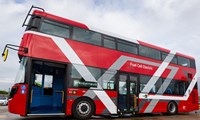
Transport for London (TfL) has ordered 20 hydrogen-fuelled green buses – which produce no pollution from their exhausts – as part of its drive to make London’s transport zero-emission. It follows the introduction of the world’s first Ultra Low Emission Zone (ULEZ) last month.
The environment-friendly vehicles will be introduced on routes 245, 7 and N7, with people travelling to Wembley Stadium, or from west London to the West End, able to hop on the new green buses for a smoother and quieter journey. The new buses will also enhance the customer experience, with on-board USB charging points making bus travel even more attractive.
TfL is investing £12 million in the new buses and the fuelling infrastructure. Wrightbus in Northern Ireland will manufacture them, creating new jobs in the region. More than £5 million of funding is being provided by European bodies and £1 million from the Office of Low Emission Vehicles.
To encourage the take-up of this trailblazing technology in other cities in the UK and Europe, TfL is leading procurement within the ‘Joint Initiative for hydrogen Vehicles across Europe’ (JIVE) project. JIVE aims to bring down the cost of the vehicles by buying in bulk with other authorities – helping put the price per bus on a par with the other cleanest fuels.
Sadiq Khan, Mayor of London, said: “We all have a role to play in cleaning up London’s toxic air and I’ve always said that TfL should lead from the front. Following the launch of the world-first Ultra Low Emission Zone last month I’m delighted that TfL has signed a contract to bring 20 state-of-the-art, zero-emission hydrogen buses to London’s streets. We are investing a record £85 million in cleaning up our bus fleet, and I am proud that London now has the largest zero-emission bus fleet in Europe.”
About Intelligent Transport
 Serving the transport industry for more than 15 years, Intelligent Transport (formerly Eurotransport) is the leading source for information in the urban public transport sector. Covering all the new technologies and developments within this vitally important sector, Intelligent Transport provides high-quality analysis across our core topics: Smart Cities, Digitalisation, Intermodality, Ticketing and Payments, Safety and Security, The Passenger, The Fleet, Business Models and Regulation and Legislation. With articles from across the globe, we explore how and why industry decision makers operate the way they do, and examine how technology is changing the dynamics of transport.
Serving the transport industry for more than 15 years, Intelligent Transport (formerly Eurotransport) is the leading source for information in the urban public transport sector. Covering all the new technologies and developments within this vitally important sector, Intelligent Transport provides high-quality analysis across our core topics: Smart Cities, Digitalisation, Intermodality, Ticketing and Payments, Safety and Security, The Passenger, The Fleet, Business Models and Regulation and Legislation. With articles from across the globe, we explore how and why industry decision makers operate the way they do, and examine how technology is changing the dynamics of transport.




Comments
There are no comments yet for this item
Join the discussion